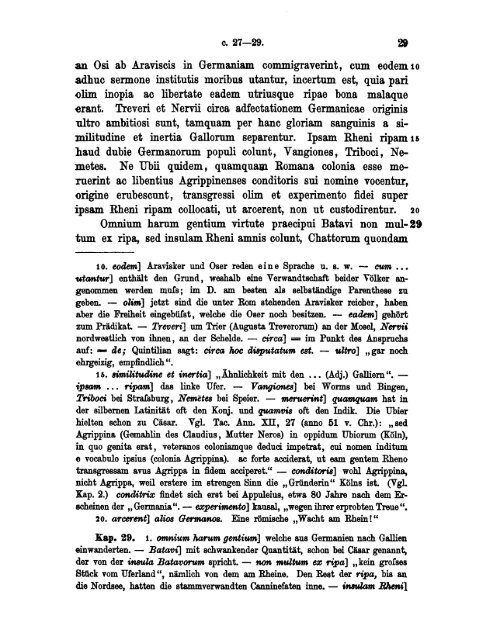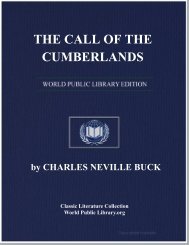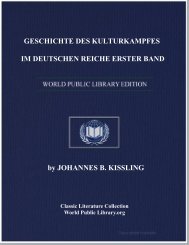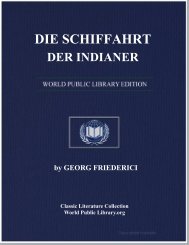de origine, situ, moribus ac populis germanorum liber - World eBook ...
de origine, situ, moribus ac populis germanorum liber - World eBook ...
de origine, situ, moribus ac populis germanorum liber - World eBook ...
Sie wollen auch ein ePaper? Erhöhen Sie die Reichweite Ihrer Titel.
YUMPU macht aus Druck-PDFs automatisch weboptimierte ePaper, die Google liebt.
c. 27-29.<br />
an Osi ab Araviscis in Germaniam commigraverint, cum eo<strong>de</strong>m 10<br />
adhuc sermone institutis moribu8 utantnr, incertum est, quia pari<br />
()lim inopia <strong>ac</strong> <strong>liber</strong>tate ea<strong>de</strong>m utriusque ripae bona malaque<br />
erant. Treveri et N ervii circa adfectationem Germanicae originis<br />
ultro ambitiosi sunt, tam quam per hanc gloriam sanguinis a similitudine<br />
et inertia Gallorum separentur. Ipsam Rheni ripam 15<br />
haud dubie Germanorum populi colunt, Vangiones , Triboci, N emetes.<br />
N e Ubii qui<strong>de</strong>m, quamquam Romana colonia esse mernerint<br />
<strong>ac</strong> libentius Agrippinenses conditoris sui nomine vocentur,<br />
<strong>origine</strong> erubescunt, transgressi olim et experimento fi<strong>de</strong>i super<br />
ipsam Rheni ripam collocati, ut arcerent, non ut custodirentur. 20<br />
Omnium harum gentium virtute praecipui Batavi non mul-It<br />
tum ex rip a, sed insulam Rheni amnis colunt, Chattorum quondam<br />
10. eo<strong>de</strong>m] Aravisker und Oser re<strong>de</strong>n eine Spr<strong>ac</strong>he u. s. w. - cum .••<br />
utcmttW] enthilt <strong>de</strong>n Grund, weshalb eine Verwandtschaft bei<strong>de</strong>r Yolker angenommen<br />
wer<strong>de</strong>n muts; im D. am besu,n als selbstandige Parenthese zu<br />
geben. - oli",] jetzt sind die unter Rom stehen<strong>de</strong>n Aravisker reicher, haben<br />
aber die Freiheit eingebii£st, welche die Oser noch besitzen. - ea<strong>de</strong>m] gahort<br />
zum Pridikat. - Treven1 um Trier (Augusta Treverorum) an <strong>de</strong>r Mosel, NertJii<br />
nordwestlich von ihnen, an <strong>de</strong>r 8chel<strong>de</strong>. - circa] === im Punkt <strong>de</strong>s Anspruchs<br />
auf: =-= <strong>de</strong>; Quintilian sagt: circa hoc dispu,tatu,m est. - ultro] "gar noch<br />
ehrgeizig, empfindlich".<br />
15. rimilitudine et inertia] "Ahnlichkeit mit <strong>de</strong>n .•. (Adj.) Galliem ". -<br />
ip8tJfll ••• ripam] das linke Ufer. - VangioneB] bei Worms und Bingen,<br />
Triboci bei StraCsburg, Nemetes bei Speier. - fMrUermt] qu,amquam hat in<br />
<strong>de</strong>r silbemen Latinitit oft <strong>de</strong>n Konj. und quamtJis oft <strong>de</strong>n Indik. Die Ubier<br />
hielten schon zu Cisar. Vgl. T<strong>ac</strong>. Ann. Xll, 27 (anno 51 v. Chr.): "sed<br />
Agrippina (Gemablin <strong>de</strong>s Claudius, Mutter Neros) in oppidum Ubiorum (Koln),<br />
in quo genita erat, veteranos coloniamque <strong>de</strong>duci impetrat, cui nomen inditum<br />
e vocabulo ipsius (colonia Agrippina). <strong>ac</strong> forte <strong>ac</strong>ci<strong>de</strong>rat, ut eam gentem Rheno<br />
transgres8am avus Agrippa in fi<strong>de</strong>m <strong>ac</strong>ciperet." - conditoris] wohl Agrippina,<br />
nicht Agrippa, weil erstere im strengen Sinn die "Grfin<strong>de</strong>rin" Kolns ist. (V gl.<br />
Kap. 2.) COftditria; fin<strong>de</strong>t sich erst bei Appuleius, etwa 80 Jahre n<strong>ac</strong>h <strong>de</strong>m Erscheinen<br />
<strong>de</strong>r "Germania". - wperimmto] kausal, "wegen ihrer erprobten Treue".<br />
2 o. arcerent] alios Germanos. Eine romische "W<strong>ac</strong>ht am Rhein!"<br />
Kap. 29. 1. omnium haNm gentium] welche aus Germanien n<strong>ac</strong>h Gallien<br />
einwan<strong>de</strong>rten. - Batavtl mit schwanken<strong>de</strong>r Quantitit, schon bei Casar genannt,<br />
<strong>de</strong>r von <strong>de</strong>r iMUla Batavorum spricht. - tUm ",ultum ez ripa] "kein gro£ses<br />
Stuck vom Uferland", nimlich von <strong>de</strong>m am Rheine. Den Rest <strong>de</strong>r ripa, bis an<br />
die Nordsee, hatten die stammverwandten Canninefau,n inne. - iMtUam Rhenil

















